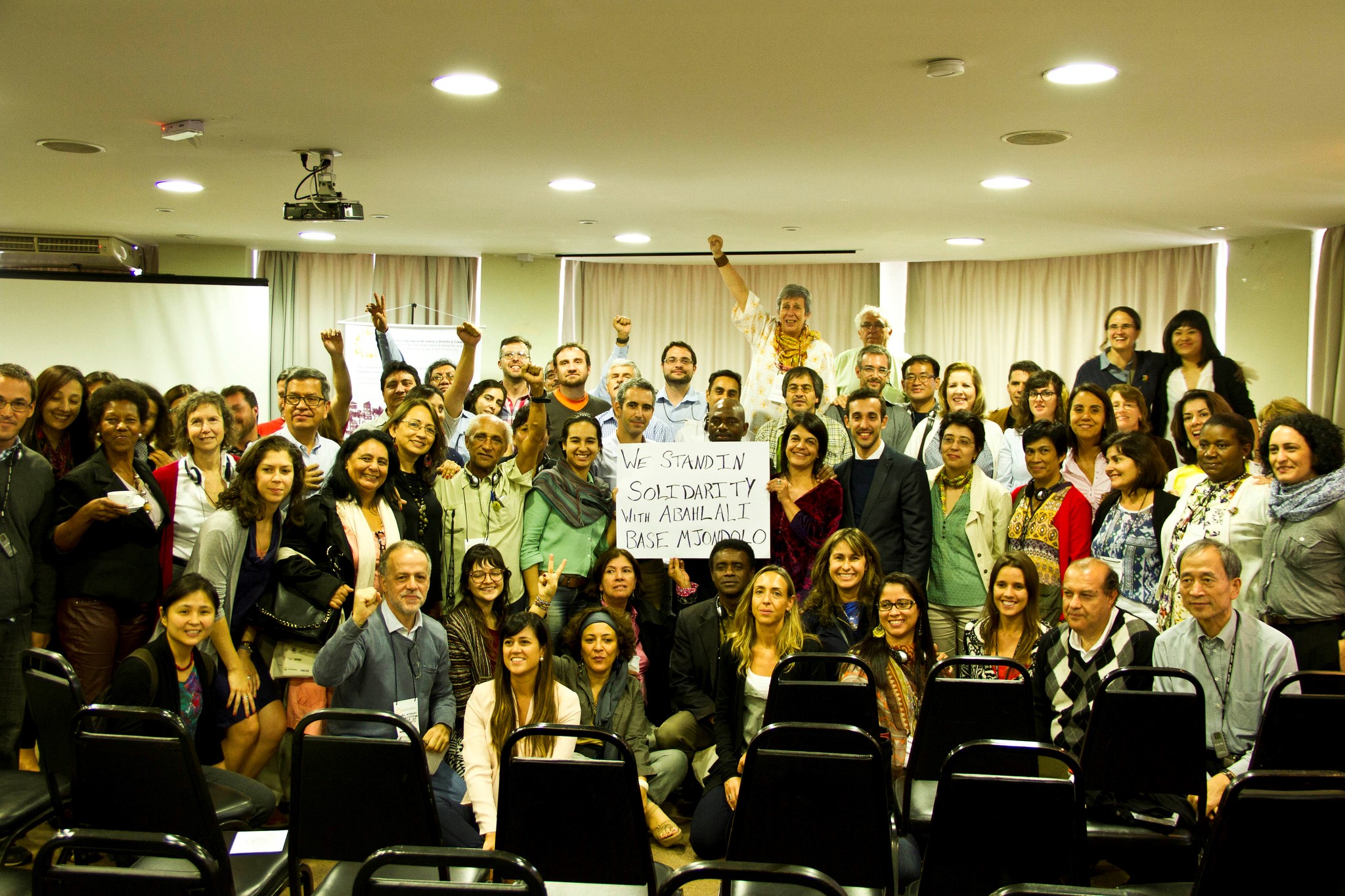Statement of Outcomes of the International Meeting on the Right to the City
Sao Paulo 12-14 November 2014
The International Meeting on Right to the City (www.righttothecityplatform.org.br) was held on 12, 13 and 14 November 2014, and gathered 158 participants from Latin American, African, Asian and European countries representing non-governmental organizations, networks and forums, academic institutions, public sector, social movements, foundations and international organizations, totaling 104 institutions from local, regional, national and international levels.
The initiative of the Global Platform on the Right to the City was discussed previously in the International workshop “Advancing the Implementation of the Right to the City in Latin America and in the International Arena” (17-18 October 2013), held in Mexico City, that aimed to evaluate the partial results obtained by the international research on the implementation of this right in countries and cities in Latin America (Brazil – Colombia – São Paulo and Bogota) Europe (Italy and Spain – London, Hamburg and Istanbul) and Africa (South Africa, Kenya, Jerusalem and Cairo). Not too long after and as part of this process, meetings were organized during the VII World Urban Forum, held in April in Medellin, Colombia, to discuss the proposal of the Global Platform and training activities on ways to implement the right to city.
The meeting encouraged the construction of the Global Platform on the Right to the City, including principles, concepts, themes, commitments, goals and action plans for the construction of fair, democratic and sustainable cities. Among the topics addressed are: the implementation prospects of the right to the city, women safety in the cities, the current urban conflicts as well as the themes contained in the report prepared based on the international research on forms to implement the right to the city in different regions of the globe.
The International Meeting promoted through workshops and panels discussions around the structuring axes themes of the Global Platform, namely: I. Human Rights in the Cities; II. Participatory and Democratic Governance in the Cities; III. Urbanization, Sustainable Use of the Territory and Social Inclusion; IV. Economical Development and Social Inclusion in the Cities.
The International Meeting also worked to outline the structure of the Global Platform’s Action Plan that contains the following components: I. Forms of Incidence of the Global Platform on the Right to the City; II. Research, Training and Capacity Building on the Right to the City; III. Communication, Raise-awareness and Cultural Dimension of Global Platform on the Right to the City; IV. Articulation and Alliances of the Global Platform on the Right to the City. To construct this Action Plan, working groups were formed for each of the four areas above. The participation in such groups is open to institutions, organizations, forums and networks that are interested in participating and collaborating in the development of the Global Platform on the Right to the City.
At the closing of the meeting, it was approved the Statement of Solidarity to Abahlali baseMjondolo expressing grave concern about the recurring acts of intimidation, threats, arbitrary arrests, killings and other acts of violence perpetrated against Abahlali baseMjondolo, organization of slums dwellers of South Africa who work to advance the fight for people’s right to decent housing, right to the city and to build a society based on respect, equality, justice and human dignity for all.
It is worth mentioning the contribution of the proposing organizations in the preparation of the documents and coordination of the meeting activities that provided opportunities for dialogue among all participants of the meeting for the construction of the Global Platform on the Right to the City.
The International Meeting was a strategic moment and space to build the Global Platform and an international movement for the right to the city; as well as to contribute to the adoption of commitments, public policies, projects, actions aimed at developing fair, democratic, sustainable and inclusive cities by the United Nations bodies and national and local governments.
Therefore, the construction of a Global Platform on the Right to the City at this moment is of utmost importance to the strengthening of local and national urban social struggles and to the international mobilization and articulation, especially to influence the processes of definition of the Agenda Development/Sustainable Development Goals Post-2015 as well as the United Nations Conference on Human Settlements (HABITAT III), in 2016, the World Social Forums and the World Urban Social Forum, in 2017.
There are many challenges to surpass in order to obtain advances in the coming years for the development of fair, democratic, sustainable and inclusive cities having as reference a Global Platform Right to the City.
1. Membership to Global Platform on the Right to City
By the beginning of 2015, we will have a Charter of Principles on the Global Platform on the Right to the City for membership purposes of institutions, organizations, forums and networks with the objectives of this Platform. This Charter will be sent to all meeting participants and their networks and will be available at Platform’s site (www.righttothecityplatform.org.br).
2. Spaces for Construction of the Global Platform on the Right to the City
The continuity of the discussion process regarding the development of the Global Platform will be based on the revised document of the International Meeting on the structuring axes themes of the Global Platform and will have as international strategic spaces, in the first half of 2015, the World Social Forum in Tunis (24-28 March) and the Second Preparatory Meeting (PrepCom) of Habitat III in Nairobi, Kenya (14-16 April).
At the same time, it will be essential for the construction and dissemination of the Global Platform’s initiative to conduct regional and national meetings that contribute to strengthening movements, forums and networks that are promoting local and national actions related to the right to the city, as the Second Latin American and Caribbean Forum on adequate housing and city in Monterrey, Mexico (5-8 May) and the VI World Forum of Cities for Human Rights in Gwangju, South Korea (14-18 May).
3. Forms of participation at the Global Platform on the Right to the City
Participation may be realized through the working groups already mentioned for the development and implementation of the Action Plan, which was developed during the International Meeting, by institutions and organizations who are interested in joining and contributing.
The organization of forums or regional groups of the Global Platform (Africa, Asia, Europe, Latin America and North America) formed by institutions and organizations in each of these regions that are interested in participating and fostering joint actions will also be promoted. At the same time, it can be organized forums or national groups of the Global Platform similar to the existing National Forum of Urban Reform in Brazil.
The Global Platform for the Right to the City will have an overall coordination composed of international organizations and networks that have expressed their interest and commitment to undertake this responsibility and leadership role. It is considered as a primary nucleus of coordination of the Platform the international organizations co-organizing the International Meeting.
4. Publication and dissemination of the outcomes of the International Meeting on the Right to the City
The meeting’s organizing team from Polis Institute, Brazilian Institute of Urban Law and Habitat International Coalition are responsible for the preparation and dissemination of the following documents of the International Meeting on the Right to the City, until the end of January 2015, that will be sent to all participants of the meeting and will also be available on the platform site (www.righttothecityplatform.org.br):
– Charter of Principles for Membership to the Global Platform on the Right to the City;
– Main Structuring Axes of the Global Platform on the Right to the City;
– Action Plan – Organization and Mobilization of the Global Platform on the Right to the City;
– Memory of the International Meeting on the Right to the City;
– Recordings of the sessions of the meeting that were transmitted online to be made available in the Platform website and on youtube;
– List of Participants and report on the profile of participants of the Meeting;
– List of contacts for membership and participation at the Global Platform on the Right to the City.
The city is a right, not a commodity!
Proposing organizations of the International Meeting Right to the City
ActionAid – Associação Brasileira dos Municípios – Avina Foundation – Cities Alliance – Ford Foundation – Fórum Nacional de Reforma Urbana (FNRU) – Frente Nacional de Prefeitos, Brazil – The Global fund for cities development (FMDV) – Habitat for Humanity – Habitat International Coalition (HIC) – Instituto Brasileiro de Direito Urbanístico – International Alliance of Inhabitants (IAI) – Ministério das Cidades, Brazil – Polis: Instituto de Estudos, Formação e Assessoria em Políticas Sociais – Secretaria de Relações Internacionais e Federativa e Secretaria de Direitos Humanos e Cidadania, Prefeitura do Município de São Paulo – Shack/Slum Dwellers International (SDI) – UCLG Committee on Social, Inclusion, Participatory Democracy and Human Rights – Women in Informal Employment, Globalizing and Organizing (WIEGO)







